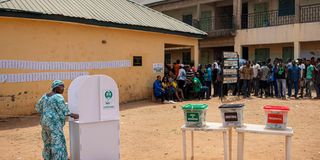UN sounds alarm over risk of electoral violence in Nigeria

A voter marks her ballot in a voting booth at a polling station in Abuja on February 25, 2023, during Nigeria's Presidential and General Election. According to the UN, the electioneering season in Nigeria has witnessed a surge in the use of inflammatory language and hateful and divisive rhetoric.
The United Nations (UN) has sounded an alarm over the risk of electoral violence in Nigeria as it went to polls today, February 25.
Ms Alice Wairimu Nderitu, special adviser of the UN on the prevention of genocide, on Thursday said the electioneering season in the Western African country has witnessed a surge in the use of inflammatory language, hateful and divisive rhetoric, which she says are a precursor to war and even genocide.
“Hate speech, especially if accompanied by policies and practices that discriminate against populations based on their identity often results in hate crimes, discrimination, and violence and can be both a precursor and a trigger of atrocity crimes, in particular genocide,” Ms Nderitu warned in a statement on Friday.
“My job is to prevent genocide and related crimes. More specifically, I am charged with raising alarm through early warnings to the secretary general and the security council when there is a risk of genocide and related crimes and mobilising action to prevent or stop that risk,” she added.
The pointers, according to the UN assessment framework, paint a gloomy picture of the situation in the country, ticking against negative parameters that could easily lead to a boil over.
“Early warning signs and risk factors include dissemination of hate speech, the politicisation of identity, the proliferation of local militias and other armed groups; particularly dehumanising types of violence inflicted upon civilians based on their ethnicity, religion, race or nationality, intergroup tensions and attacks against civilian populations, long-standing structural discrimination, deep economic inequalities and social exclusion, and shrinking democratic and civic spaces,” reads the statement.
While elections are not a risk factor, they sometimes provide excuses and exacerbate tensions that could lead to violence.
The adviser has therefore called for independent mechanisms to address the risks, which have been amplified by digital technology.
“By addressing divisive and harmful language, we can avoid escalation of tensions that could result in violence. Measures to that effect can also help build societies that are resilient and inclusive. Actions to support victims are especially vital,” said the adviser of the global agency.
Ms Nderitu’s office leads the implementation of the UN Strategy and Plan of Action on Hate Speech, launched by Secretary-General Antonio Guterres in 2019. The strategy sets out guidance for UN entities and other societal actors to address hate speech at the national and global level, and enhance efforts to tackle the root causes and drivers of hate speech, including racism and racial discrimination.
The strategy is in line with international human rights standards, and with the right to freedom of opinion and expression.
They use the UN Framework of Analysis for Atrocity Crimes to assess the risk of genocide, war crimes or crimes against humanity. The framework sets out risk factors and indicators as pointers to early warnings.
“I should emphasise that my role as under Secretary-General and Special Adviser on the Prevention of Genocide is not to decide whether Genocide, has taken place. This is the responsibility of independent courts of justice that have the jurisdiction to make those judgements. Our focus is on the prevention of genocide and related crimes, detecting risk factors with the objective of mitigating and de-escalating them.
“I also emphasise accountability for electoral-related violence. Lack of accountability can be detrimental to making and sustaining peace. Peace and justice are not contradictions or mutually exclusive categories. Accountability constitutes a key component of peace,” said Ms Nderitu.
Further, she urged tech and social media companies to utilise all tools available to stop the spread of hate speech that could constitute an incitement to discrimination, hostility, or violence on their platforms.
“I know that the potential for division and mistrust resides in all societies. But, so too, do the qualities of mutual respect, dignity, understanding, justice for all, and reconciliation that recognises the suffering of all victims and does not attribute collective guilt to entire ethnic or religious communities for the crimes of a few,” she says.
Last year, the adviser’s office convened traditional leaders from across the world in Abuja to develop a Plan of Action for Atrocity Prevention. The drafting of the plan was led by traditional leaders from Nigeria and includes enhancing the engagement of the UN office with traditional leaders, to support them as champions of prevention globally.
It builds on work previously done by the adviser together with religious leaders and actors to prevent atrocity crimes resulting in the Fez plan of action.





